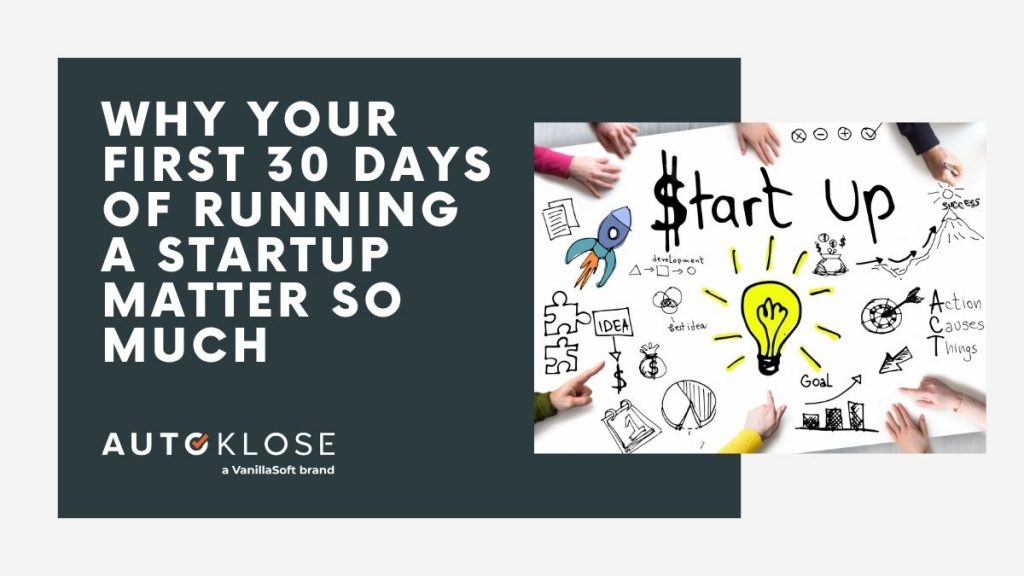
- Startup life is notoriously stressful. With a little luck and a lot of work, it will eventually be rewarding, too.
- Co-host of 0 to 5 Million and Autoklose founder Shawn Finder knows firsthand exactly how challenging running one’s own company can be. But there’s a proven playbook he’s willing to share. Spoiler alert: Your first month in business begins at least six months before launch.
- Shawn and co-host Ollie Whitfield talk about the do’s, don’ts and absolute musts founders need to know before launching a startup (and how to ensure its first month is a roaring success).
If you’re a budding entrepreneur, you’ll find plenty of biographies to help guide your way through the startup ecosystem. But without some practical advice, you risk going the way of Elizabeth Holmes instead of Steve Jobs.
And if you’re not being funded by the likes of Larry Ellison, strategy is everything.
“I always tell people: You want to start your launch six months beforehand, just like a company going IPO,” says Autoklose co-founder Shawn Finder.
“It’s not like nobody knows the IPO date. There’s a marketing lead-up to it. It’s the same way when you start your business.”
That’s why, when Shawn launched Autoklose (acquired by VanillaSoft in 2020), he made sure he had his “Infrastructure down” and was “ready to start growing.”
On an episode of the 0 to 5 Million podcast, Shawn and I talked about:
- Laying the groundwork for launch months in advance
- How much money you need to save (if at all)
- Why you should be ready to take on every job in your company
- His biggest mistake (hint: brush up on Excel)
Countdown to launch: The 6-month head start
I suggested that launching a startup might be like building a house. You can try to account for everything, but it’s likely that something won’t go as planned. It’s easy to go over budget, encounter issues with drainage, or experience unexpected delays. You can only do the best you can to mitigate these problems.
Shawn agrees and notes, “You can’t build a house without permits.”
A new business needs groundwork, too: articles of incorporation, business bank accounts and/or lines of credit, terms and conditions to which clients must agree — “all that fun stuff,” says Shawn. “Well, not fun stuff, but legal stuff.”
The legal stuff should be in place “way before” you launch, he adds.
But that’s just the beginning.
Grow your (prospective) customer base
Over the six months before he officially rolled out Autoklose, Shawn built an email list of “people who were going to follow me along that journey,” he says.
That also meant developing a landing page to explain what was in store and ramp up interest in what the company had to offer. By the time he was ready to launch, he “already had the company as a whole — the infrastructure — down, and ready to start growing.”
Because he had been sharing the development of his startup for months, “we had thousands of people waiting for it,” he adds. His built-in customer base was already invested in the success of the company. So when Autoklose asked them for $20 or $30 to sign up for its service, “not one person said no,” Shawn recalls.
“We were sitting in the boardroom doing demo after demo — and these weren’t cold demos, these were people who said: It was amazing watching your journey. Let’s just say those first 50 or 100 were the easiest sales of my life.”
Stash away some funds
When he started his first business, Shawn still had a full-time job.
“I was doing everything on the side,” he says.
He had a plan, though.
“I went from a six-figure sales job to making $49.99 on my first subscription,” he says. “I left after [profits reached] $50.”
However, Shawn saved up “six months of runway money in the bank — so I could pay my mortgage.”
He also ensured there was enough for date nights with his girlfriend (now his wife) — everything he needed to live his life without struggling.
That’s a common tactic, and it makes a lot of sense.
Shawn and I spoke to sales trainer extraordinaire Jeff Bajorek for an Autoklose webinar called “Secrets to Sales Success.” Jeff started his business in a similar way. But he didn’t initially intend to go full-time, so he didn’t have as much time to prepare. The key to his success: He had already secured a few high-level clients.
Crunch your numbers
Plenty of folks quit their day jobs to become entrepreneurs, even if they’re not ready to do so.
So, my next question was: Can you make a go of it without a nest egg? Lately, we’ve seen others launch companies in basically no time.
In my opinion, you just have to have the bankroll, but we’re not all well-off enough to do that.
While that’s true, Shawn argues that in some cases, keeping your day job is overrated.
When you work for a company, taxes on your salary can be significant. You should know about how to claim different tax reliefs like Enterprise Investment Scheme (EIS), etc. Keeping accurate financial records, including pay stubs, can help you manage these expenses more effectively and make informed financial decisions for your startup.
“Here in Canada, between 30% to 45% of your money is taken by the government. But if you start a business… Say you’re making $100,000 at the company you’re currently working for. You only have to make $50,000 yourself to make [essentially] the same amount.”
That’s because you can write off so many expenses: rent, supplies, equipment, dinners —
“everything is a write-off,” he adds. “I don’t think people realize that.”

Get ready to do everything yourself
Something strange happens when you realize: I have a business now, says Shawn.
You need marketing. You need a graphic designer. You need people to take care of operations and sales — “and guess what?” he asks.
“You’re going to do all of them. You’ll wear every hat.”
To this day, any of Autoklose’s clients might recognize the name “Jeffrey Finder” as a longtime support agent.
Jeffrey is Shawn’s middle name, as well as his alias when he’s in the customer service queue.
For the first few months, the company was in business, “nobody knew it was actually the CEO answering every support ticket,” he says.
Back then, he was the point person for just about every role. If he got a call for the marketing department?
“No problem,” he says. “Let’s put on Steve. ‘Steve’ was me.”
Once Autoklose grew, Shawn could afford to hire a marketing specialist. Eventually, he hired an entire team. But early on, he says every founder should expect to do a little of everything. And that’s not a bad thing.
He knows a little bit about development, “because every morning at 8 a.m., my developers and I had a call.”
He understands marketing and website design for the same reasons — enough, at least, so “if anyone asked me, I could answer,” he says.
Even now, he still sometimes dips into the support role to keep abreast of what customers need help with.
“I know a lot about certain things, but a little bit about everything.”
Keep it clean (your balance sheet, that is)
The biggest mistake he made was not keeping track of the financials in the company’s early days.
Shawn says an up-to-date balance sheet is a non-negotiable must. Shawn didn’t realize this early on, “but it came back to bite me in the butt a year and a half later,” he says.
For the first 18 months or so after launching his first company, he didn’t even do his taxes because he was so busy building the business. When the time comes to sell your business, buyers want to see audited financials, including income statements.
If you don’t have them, you lose your leverage in any negotiations.
“Know your reporting, know how many customers you have, know your cost to get a customer, know your average revenue per customer — and have an accountant who sends you that report every month if you don’t do it yourself.”
This is based on a conversation from The 0 to 5 Million Podcast, featuring founders, CEOs, and revenue leaders from businesses between 0 and 5 million in ARR. Subscribe to future episodes to find out how they did it.

 The Autoklose
The Autoklose 


Leave a Reply
You must be logged in to post a comment.